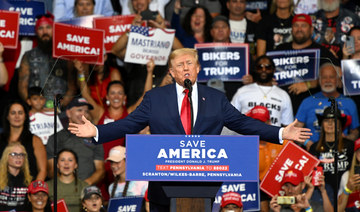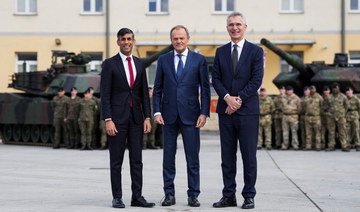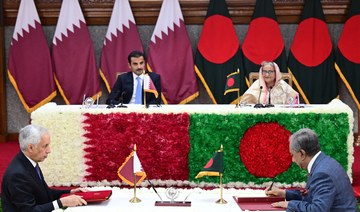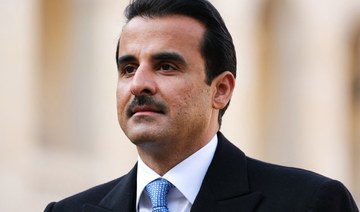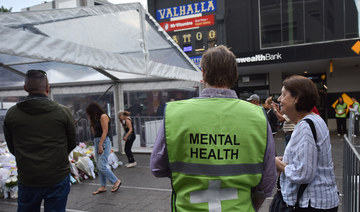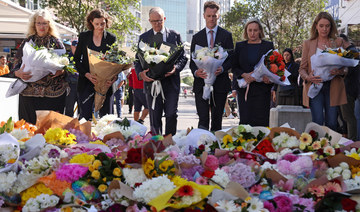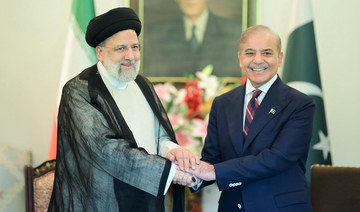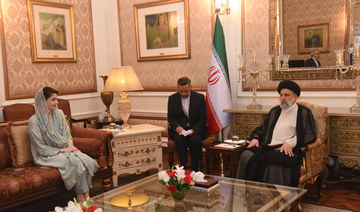NEW YORK: New York’s attorney general says her three-year investigation of former President Donald Trump uncovered potential crimes in the way he ran his real estate empire, including allegations of bank and insurance fraud.
So why isn’t Trump being prosecuted?
Attorney General Letitia James didn’t seek to slap handcuffs on the Republican this week, as some of his critics hoped. Instead, she announced a civil lawsuit seeking $250 million and his permanent banishment from doing business in the state.
Like many things involving the law and Trump, the reasons James, a Democrat, opted for a lawsuit rather than a prosecution are complicated.
For one, even if she did want to prosecute Trump, she doesn’t have jurisdiction under state law to bring a criminal case against him or any of the lawsuit’s other defendants, including the Trump Organization and his three eldest children, Donald Jr., Ivanka and Eric Trump.
In New York, the state attorney general’s office is only allowed to prosecute a limited range of offenses on its own, like bid rigging and payroll violations.
Otherwise, the office must partner with a county district attorney on a prosecution — as James’ office did with the Manhattan district attorney’s office in a case against Trump’s longtime finance chief — or obtain what’s known as a criminal referral from the governor or a state agency that has jurisdiction over the alleged wrongdoing.
Even then, mounting a criminal fraud case is far more challenging than a civil lawsuit.
In a criminal case, prosecutors would have to prove beyond a reasonable doubt that Trump intended to commit a crime. In the lawsuit — if it goes to trial — jurors would only need to be persuaded it was more likely than not that wrongdoing occurred.
Filing a civil lawsuit while letting others sort out potential criminal violations is a sound strategy, legal experts said, allowing James to seek remedies other than prison time.
It allows the attorney general to avoid the kind of internal debate about criminal charges that fractured the Manhattan district attorney’s parallel investigation into Trump earlier this year.
No former US president has ever been charged with a crime.
The prospect of Trump, 76, behind bars as a result of a criminal prosecution could give juries pause, make judges more careful and make winning more difficult, said University of Richmond law professor Carl Tobias.
“Even for Trump, people don’t like him, but do they want to put him away?” Tobias said. “What would it take? What kind of punishment would be appropriate? So it’s just all around more difficult.”
A civil case, given its lower burden of proof standard, is “a lot easier to assemble ... and probably win,” Tobias said.
Trump, a Republican who’s laying the groundwork for another presidential run in 2024, has derided James as “a fraud who campaigned on a ‘get Trump’ platform.’”
In an interview Wednesday night with Fox News Channel’s Sean Hannity, Trump suggested that his company had protected itself against possible fraud allegations by warning banks and potential business partners not to trust the information in its financial disclosures.
“We have a disclaimer right on the front,” Trump said. “’You’re at your own risk.’ ... ‘Be careful because it may not be accurate. It may be way off.’ ... ‘Get your own people. Use your own appraisers. Use your own lawyers. Don’t rely on us.’”
James said at a news conference Wednesday that her office was referring its findings to the US attorney’s office in Manhattan and the Internal Revenue Service, and would share evidence of possible state law violations with the Manhattan district attorney’s office, if requested.
The US attorney’s office in Manhattan said it was aware of James’ referral of potential criminal violations, but otherwise declined comment. The Internal Revenue Service’s criminal investigation division said it “doesn’t confirm the existence of investigations until court documents are publicly available.”
Manhattan District Attorney Alvin Bragg said his probe of Trump was “active and ongoing.”
The former prosecutor who had been leading Bragg’s investigation, Mark Pomerantz, resigned in February because he felt the office should be moving more quickly to bring criminal charges against Trump.
In a resignation letter, Pomerantz wrote that he believes the former president is “guilty of numerous felony violations.”
He said he had told Bragg there was “evidence sufficient to establish Mr. Trump’s guilt beyond a reasonable doubt” of many of the same allegations that now appear in James’ lawsuit — including that Trump falsified financial statements to secure loans and burnish his image as a wealthy businessman.
If there’s no settlement agreement, James’ lawsuit against Trump could take years to play out and might not be resolved before the 2024 presidential election.
A fraud lawsuit James filed against the National Rifle Association recently entered its third year, slowed by legal wrangling and the powerful gun advocacy group’s attempts to get the case thrown out. No trial date has been set.
Drawn out legal proceedings could hurt Trump’s business by making lenders and potential partners reluctant to cut deals. But, if history is any guide, it’s not likely to be a crushing blow. Against the odds, and despite no shortage of legal battles in recent years, the company has been able to get new loans and raise money.
In February, the Trump Organization got a $100 million from a California bank to refinance commercial and retail space in its Trump Tower headquarters. That deal was struck just three days after Trump’s long-time accountants, Mazurs, disavowed a decade of financial statements it had helped prepare — a serious blow to his business reputation.
That big loan also came after the Trump Organization had already been indicted on fraud charges by the Manhattan district attorney’s office for allegedly helping executives evade taxes. That case is scheduled to go to trial next month.
Another recent victory for Trump as his legal troubles mount: Selling his Washington D.C. hotel for $375 million, far more than expected.
Several lending experts said the new loan show why much of Trump’s business is insulated from his political and legal storms: What matters most in real estate is the cash thrown off by rent and the collateral of the buildings — not the reputation of the owner.
NY probe found potential crimes. Why isn’t Trump in cuffs?
https://arab.news/wcxhz
NY probe found potential crimes. Why isn’t Trump in cuffs?
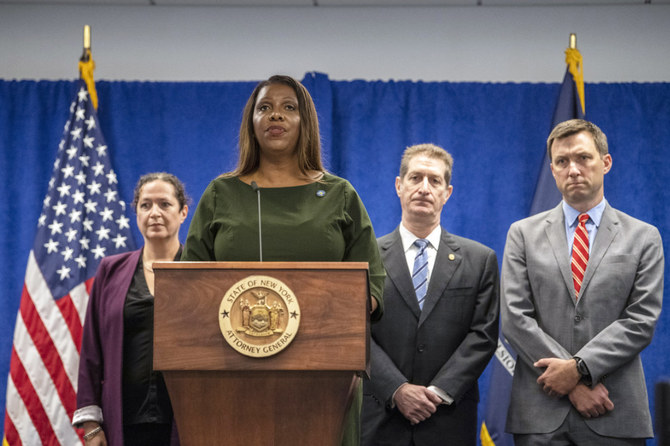
- In New York, the state attorney general’s office is only allowed to prosecute a limited range of offenses on its own, like bid rigging and payroll violations
Columbia University cites progress with Gaza war protesters following encampment arrests

A smaller encampment remained on campus Wednesday morning
NEW YORK: Columbia University said early Wednesday that it was making “important progress” with pro-Palestinian student protesters who set up a tent encampment and that it was extending a deadline to clear out, yet standoffs remained tense on the Ivy League campus in upper Manhattan.
Student protesters “have committed to dismantling and removing a significant number of tents,” the university said in a statement. A smaller encampment remained on campus Wednesday morning.
Across the country, protesters at California State Polytechnic University, Humboldt, some 300 miles (480 kilometers) north of San Francisco, started using furniture, tents, chains and zip ties to block the building’s entrances Monday evening.
Both campuses are part of intensifying demonstrations over Israel’s war with Hamas by university students demanding that schools cut financial ties to Israel and divest from companies that are enabling its monthslong conflict. Dozens have been arrested on charges of trespassing or disorderly conduct.
Columbia President Minouche Shafik in a statement Tuesday set a midnight deadline to reach an agreement with students to clear the encampment, or “we will have to consider alternative options.”
By around 3 a.m., the university said that there was “constructive dialogue” and that it will continue conversations for 48 hours.
The statement said student protesters “will ensure that those not affiliated with Columbia will leave. Only Columbia University students will be participating in the protest.”
Student protesters also will comply with city fire department requirements and “have taken steps to make the encampment welcome to all and have prohibited discriminatory or harassing language,” the statement said.
The university’s statement was released hours before US House Speaker Mike Johnson’s trip to Columbia to visit with Jewish students and address antisemitism on college campuses.
Earlier Tuesday night, police arrested more than 200 protesters blocking traffic during a non-college demonstration demanding a permanent ceasefire in Gaza at Grand Army Plaza in Brooklyn, near the home of Sen. Chuck Schumer. The protest was organized by Jewish Voice for Peace on the second night of Passover, and protesters lay down a large circular banner depicting the food on a Seder plate.
At Cal Poly Humboldt, protesters chanted, “We are not afraid of you!” before officers in riot gear pushed into them at the building’s entrance, video shows. Student Peyton McKinzie said she was walking on campus Monday when she saw police grabbing one woman by the hair, and another student having their head bandaged for an injury.
“I think a lot of students are in shock about it,” she said.
Three students have been arrested, according to a statement from the school, which down the campus until Wednesday. Students had occupied a second campus building Tuesday.
Another encampment was set up Tuesday at the University of Rochester in upstate New York. Omar Darwesh, a Palestinian senior, said he has lost relatives to the war.
“We’re not calling for the destruction of Israel, we’re never talking about threatening Jews — the focus is on us and what we need, and that’s being treated like a human. We have to find a way to coexist,” he told TV station WHEC.
University of Rochester officials said in a statement that the protesters must follow ground rules, including presenting university identification if asked.
The upwelling of demonstrations has left universities struggling to balance campus safety with free speech rights. Many long tolerated the protests, which largely demanded that schools condemn Israel’s assault on Gaza and divest from companies that sell weapons to Israel.
Now, universities are doling out more heavy-handed discipline, citing safety concerns as some Jewish students say criticism of Israel has veered into antisemitism.
Protests had been bubbling for months but kicked into a higher gear after more than 100 pro-Palestinian demonstrators who had camped out at Columbia were arrested Thursday.
By late Monday at New York University, police said 133 protesters were taken into custody and all had been released with summonses to appear in court on disorderly conduct charges.
In Connecticut, police arrested 60 protesters, including 47 students, at Yale after they refused to leave an encampment on a plaza at the center of campus.
Yale President Peter Salovey said protesters had declined an offer to end the demonstration and meet with trustees. After several warnings, school officials determined “the situation was no longer safe,” so police cleared the encampment and made arrests.
A demonstration Tuesday at the University of Michigan grew to nearly 40 tents, and nine war protesters at the University of Minnesota were arrested after police took down an encampment in front of the library. Hundreds rallied in the afternoon to demand their release.
Harvard University in Massachusetts has tried to stay a step ahead of protests by locking most gates into its famous Harvard Yard and limiting access to those with school identification. The school has also posted signs that warn against setting up tents or tables on campus without permission.
Literature doctoral student Christian Deleon said he understood why the Harvard administration may be trying to avoid protests but said there still has to be a place for students to express what they think.
“We should all be able to use these kinds of spaces to protest, to make our voices heard,” he said.
Ben Wizner, a lawyer with the American Civil Liberties Union, said college leaders face extremely tough decisions because they have a responsibility to ensure people can express their views, even when others find them offensive, while protecting students from threats and intimidation.
The New York Civil Liberties Union cautioned universities against being too quick to call in law enforcement in a statement Tuesday.
“Officials should not conflate criticism of Israel with antisemitism or use hate incidents as a pretext to silence political views they oppose,” said Donna Lieberman, the group’s executive director.
Four injured as escaped army horses bolt through central London
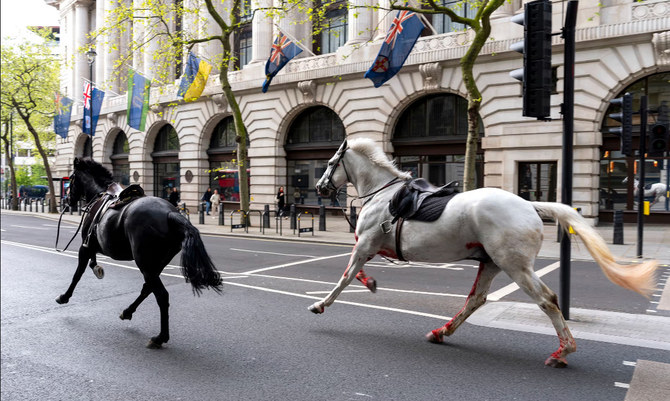
- Two horses ran along busy roads, dodging buses, taxis and other traffic
- Both were wearing saddles and bridles, with one apparently covered in blood on its chest and forelegs
LONDON: Four people were taken to hospital after spooked army horses broke loose during morning exercises in central London and galloped through the streets at rush hour, the army and emergency services said.
Photos and video posted on social media by British news outlets showed two horses running along busy roads, dodging buses, taxis and other traffic.
Both were wearing saddles and bridles, with one apparently covered in blood on its chest and forelegs.
A number of prestigious army cavalry regiments have stables in the British capital and horses are a regular sight around government buildings on Whitehall, Buckingham Palace, The Mall and in nearby Hyde Park.
London Ambulance Service said it was called at 8:25 am (0725 GMT) to reports of a person being thrown from a horse on Buckingham Palace Road.
No details were released on the injured people or the exact circumstances of their injuries.
The driver of a Mercedes car told LBC radio he had been waiting outside a hotel in Buckingham Palace Road when he felt something smash into his car.
He said he saw three or four horses near the vehicle, and that an army rider had been thrown off and injured.
One horse also reportedly crashed into a parked double-decker tour bus, smashing the windscreen.
One commuter shared a video on social media platform X, formerly Twitter, showing a black horse and a white horse being pursued by a black car.
“It was the street from Tower Bridge toward Limehouse Tunnel... just running past cars and an unmarked Range Rover following them,” the person said.
Up to seven horses initially got loose, Britain’s domestic Press Association news agency reported, with police working with the army to recapture them.
The army said in a statement that “a number of military working horses became loose during routine exercise this morning.”
“All of the horses have now been recovered and returned to camp. A number of personnel and horses have been injured and are receiving the appropriate medical attention,” it added.
Two of the horses were recaptured by the City of London Police, which polices the Square Mile financial district.
It said officers had contained two animals and that “an army horse box had collected the horses and transported them to veterinary care.”
Nepal’s president asks visiting Qatari emir to help free student held hostage by Hamas

- Al-Thani said he would do everything possible to help release Bipin Joshi
- Joshi was among 17 Nepali students studying agriculture in Alumim kibbutz
Katmandu, Nepal: Nepal’s president asked the emir of Qatar, who is on a two-day visit to the South Asian country, to help release a Nepali student held hostage by Palestinian militant group Hamas, officials said on Wednesday.
President Ram Chandra Poudel met with Sheik Tamim bin Hamad Al-Thani at the president’s house in the capital, Katmandu.
Al-Thani said he would do everything possible to help release Bipin Joshi, the Nepali president’s press adviser, Kiran Pokharel, told The Associated Press.
Joshi was among 17 Nepali students studying agriculture in Alumim kibbutz, near the Gaza Strip, when Hamas attacked Southern Israel on Oct.7. Ten of the students were killed, six injured while Joshi was abducted and taken to Gaza.
Though there has been no information on his condition or whereabouts, Nepali officials said they believed he was still alive.
Hamas’ sudden attack on Israel in October killed 1,200 people and some 250 others hostage were taken hostage. This has sparked a war that has so far killed more than 34,000 Palestinians in Gaza, at least two-thirds of them women and children, according to the local health ministry.
Qatar has played a key intermediary role throughout the war in Gaza. Along with the US and Egypt, the Gulf State was instrumental in helping negotiate a brief halt to the fighting in November that led to the release of dozens of hostages.
Pokharel also said the emir discussed the conditions of an estimated 400,000 Nepali migrant workers residing in Qatar, who mostly work in construction and manual labor. Concerns about working in extreme heat — that could reach over 40 C (104 F) — inadequate living facilities and abuse have risen in recent years.
Human Rights Watch released a statement on Sunday, asking that labor protection for migrant workers be prioritized during the emir’s visit.
The emir said there were programs planned to help Nepali workers find employment in other sectors, Pokharel said.
Al Thani also said his country planned to cooperate with Nepal on building hydropower plants, food production, and in the agriculture and tourism sectors.
The emir’s stop in Katamdnu is his last after visiting Bangladesh and the Philippines. He flies home later on Wednesday.
Australian counter terrorism force arrests seven teenagers after Sydney bishop stabbing
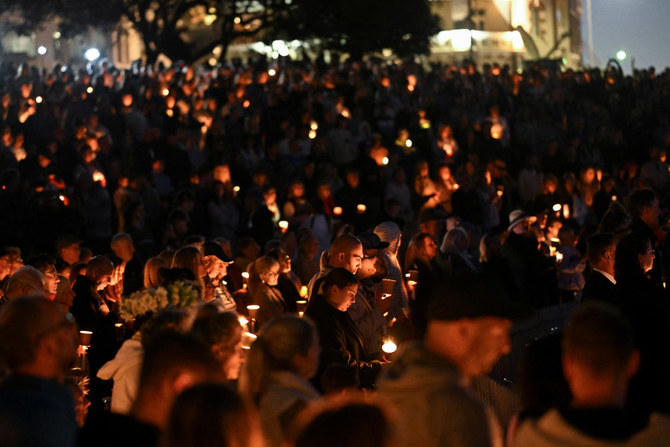
- A team of more than 400 police and security personnel were involved in the operation
- Police said they took the teens into custody because they posed an “unacceptable risk” to society
SYDNEY: An Australian counter terrorism team arrested seven teenagers on Wednesday linked to a boy charged with a religiously-motivated terror attack on a Sydney bishop and questioned another five people.
Police said a team of more than 400 police and security personnel were involved in the operation, which arrested associates of a 16-year-old boy charged with a terrorism offense for the knifing of Assyrian Bishop Mar Mari Emmanuel during a live-streamed church service on April 15.
Police said they took the teens into custody because they posed an “unacceptable risk” to society. They will allege the teens believed in a religiously motivated violent extremist ideology. A further five people are being questioned by police.
“I can assure the community there is no ongoing threat to the community, and the action we have taken today has mitigated any risk of future or further harm,” said New South Wales state Police Deputy Commissioner David Hudson at a news conference following the arrests.
Police said in a statement that the operation was ongoing.
Coming only days after a deadly mass stabbing in Bondi, the attack on Emmanuel and fears of further attacks or reprisals against the city’s Muslim community have put the normally peaceful Sydney on edge. Gun and knife crime is rare in the city, one of the world’s safest.
The Joint Counter Terrorism Team (JTT) operation, which involved 13 raids in Sydney and the regional town of Goulburn, was a combined effort between state and federal police as well as the domestic intelligence agency.
A significant amount of electronic material was seized in the raids, police said in a statement.
Australia’s top domestic spy chief on Tuesday asked technology companies to give it access to user messages in limited circumstances so it could fight extremists.
Iran president arrives in Sri Lanka as minister sought for arrest
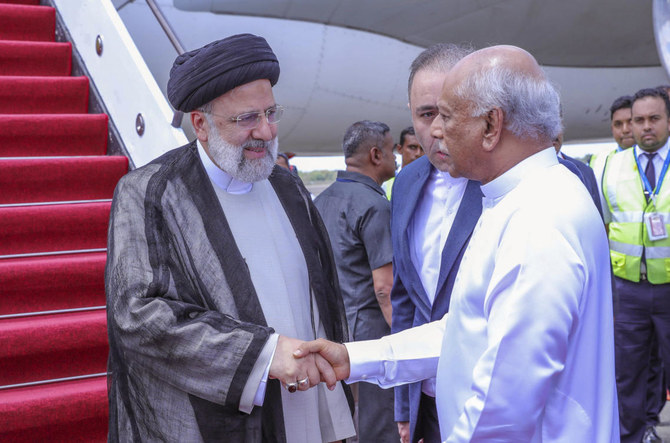
- Raisi traveled to the island nation after concluding a state visit to Pakistan
- Raisi arrived in Sri Lanka to inaugurate $514 million Uma Oya irrigation and hydro-electricity project
COLOMBO: Iranian President Ebrahim Raisi arrived in Sri Lanka on Wednesday to inaugurate a power and irrigation project, unaccompanied by his interior minister who is being sought for arrest over a deadly 1994 bombing.
Raisi traveled to the island nation after concluding a state visit to Pakistan alongside Ahmad Vahidi, accused by Argentina of orchestrating the 1994 attack on a Jewish community center in Buenos Aires that killed 85 people.
Interpol issued a red notice requesting police agencies worldwide to take Vahidi into custody, and Argentina had asked both Pakistan and Sri Lanka to arrest him.
But the minister was not seen accompanying Raisi, who had arrived in Sri Lanka to inaugurate an Iran-backed power and irrigation project.
Iran’s official news agency IRNA reported that Vahidi was back in Iran on Tuesday, where he attended a ceremony to induct a new provincial governor.
An official from Sri Lanka’s foreign ministry told AFP that the interior minister was not listed as part of the Iranian delegation.
The 1994 assault has never been claimed or solved, but Argentina and Israel have long suspected the Iran-backed group Hezbollah carried it out at Iran’s request.
Prosecutors have charged top Iranian officials with ordering the attack, though Tehran has denied any involvement.
The court also implicated Hezbollah and called the attack against the AMIA — the deadliest in Argentina’s history — a “crime against humanity.”
Delayed project
Raisi arrived at an airport in southern Sri Lanka on Wednesday morning to inaugurate the Iran-backed $514 million Uma Oya irrigation and hydro-electricity project.
It was due to be commissioned in March 2014 but sanctions against the Islamic Republic saw the project mired in a decade of delays, Sri Lanka has said.
Sri Lanka funded most of the $514 million project after an initial investment of $50 million from the Export Development Bank of Iran in 2010, while construction was carried out by Iranian firm Farab.
Sri Lanka President Ranil Wickremesinghe’s office said Raisi’s visit symbolized “the cooperation between the two nations in this significant infrastructure endeavour.”
The two reservoirs are slated to irrigate 4,500 hectares (11,100 acres) of new land, while the hydro dam generators have a capacity of 120 megawatts.
Iran is a key buyer of Sri Lanka’s tea, the island’s main export commodity.
Sri Lanka is currently repaying a legacy debt of $215 million for Iranian oil by exporting tea. The country’s only oil refinery was built by Iran in 1969.
Raisi arrived in Sri Lanka after a three-day visit to Pakistan that followed tit-for-tat missile strikes in January in the region of Balochistan, which straddles the two nations’ porous border.
Tehran carried out the first strikes against an anti-Iran group inside Pakistan, with Islamabad retaliating by hitting “militant targets” inside Iran.
Both nations have previously accused each other of harboring militants on their respective sides of the border.





